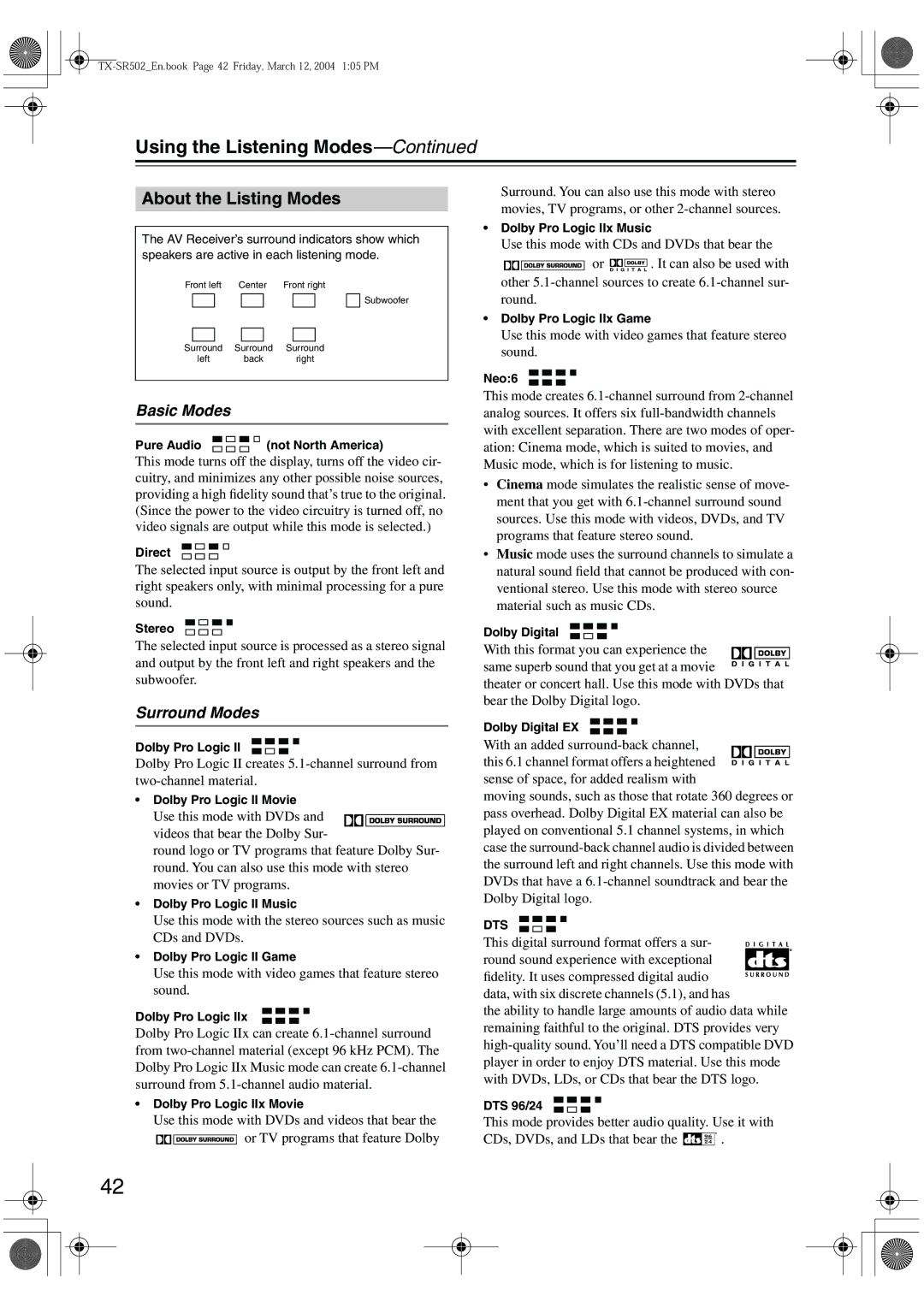
Using the Listening Modes—Continued
About the Listing Modes
The AV Receiver’s surround indicators show which speakers are active in each listening mode.
Front left | Center | Front right |
Subwoofer
Surround Surround Surround
left back right
Surround. You can also use this mode with stereo movies, TV programs, or other
•Dolby Pro Logic IIx Music
Use this mode with CDs and DVDs that bear the
![]()
![]()
![]() or
or ![]()
![]() . It can also be used with other
. It can also be used with other
•Dolby Pro Logic IIx Game
Use this mode with video games that feature stereo sound.
Neo:6
Basic Modes
Pure Audio 


 (not North America)
(not North America)
This mode turns off the display, turns off the video cir- cuitry, and minimizes any other possible noise sources, providing a high fidelity sound that’s true to the original. (Since the power to the video circuitry is turned off, no video signals are output while this mode is selected.)
Direct
The selected input source is output by the front left and right speakers only, with minimal processing for a pure sound.
Stereo
The selected input source is processed as a stereo signal and output by the front left and right speakers and the subwoofer.
Surround Modes
Dolby Pro Logic II
Dolby Pro Logic II creates
•Dolby Pro Logic II Movie
Use this mode with DVDs and videos that bear the Dolby Sur-
round logo or TV programs that feature Dolby Sur- round. You can also use this mode with stereo movies or TV programs.
•Dolby Pro Logic II Music
Use this mode with the stereo sources such as music CDs and DVDs.
•Dolby Pro Logic II Game
Use this mode with video games that feature stereo sound.
Dolby Pro Logic IIx
Dolby Pro Logic IIx can create
•Dolby Pro Logic IIx Movie
Use this mode with DVDs and videos that bear the
![]()
![]()
![]() or TV programs that feature Dolby
or TV programs that feature Dolby
This mode creates
•Cinema mode simulates the realistic sense of move- ment that you get with
•Music mode uses the surround channels to simulate a natural sound field that cannot be produced with con- ventional stereo. Use this mode with stereo source material such as music CDs.
Dolby Digital
With this format you can experience the ![]()
![]() same superb sound that you get at a movie
same superb sound that you get at a movie ![]()
![]()
![]()
![]()
![]()
![]()
![]() theater or concert hall. Use this mode with DVDs that bear the Dolby Digital logo.
theater or concert hall. Use this mode with DVDs that bear the Dolby Digital logo.
Dolby Digital EX
With an added
this 6.1 channel format offers a heightened sense of space, for added realism with
moving sounds, such as those that rotate 360 degrees or pass overhead. Dolby Digital EX material can also be played on conventional 5.1 channel systems, in which case the
DTS
This digital surround format offers a sur- round sound experience with exceptional fidelity. It uses compressed digital audio data, with six discrete channels (5.1), and has
the ability to handle large amounts of audio data while remaining faithful to the original. DTS provides very
DTS 96/24
This mode provides better audio quality. Use it with
CDs, DVDs, and LDs that bear the ![]() .
.
42
